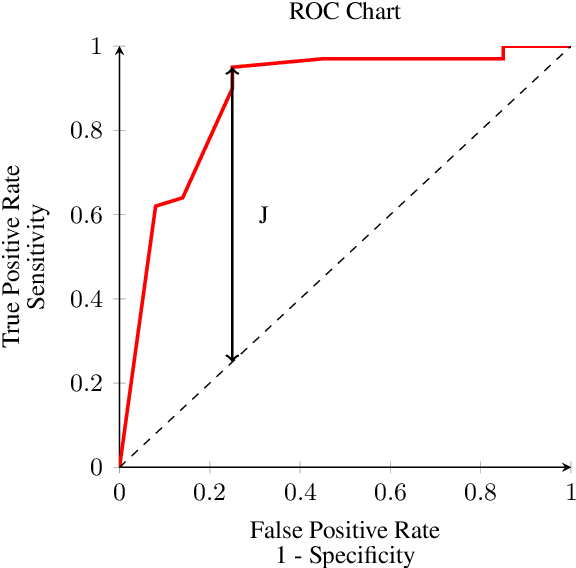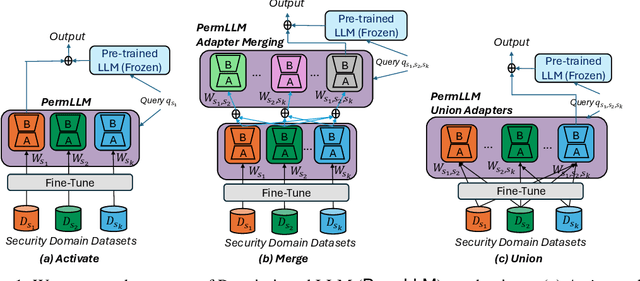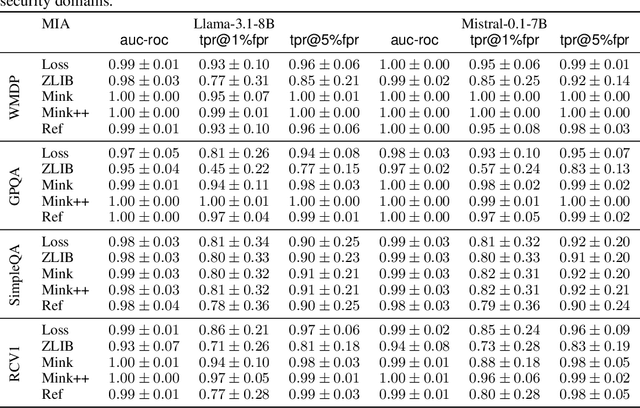William F. Shen
LoRDO: Distributed Low-Rank Optimization with Infrequent Communication
Feb 04, 2026Abstract:Distributed training of foundation models via $\texttt{DDP}$ is limited by interconnect bandwidth. While infrequent communication strategies reduce synchronization frequency, they remain bottlenecked by the memory and communication requirements of optimizer states. Low-rank optimizers can alleviate these constraints; however, in the local-update regime, workers lack access to the full-batch gradients required to compute low-rank projections, which degrades performance. We propose $\texttt{LoRDO}$, a principled framework unifying low-rank optimization with infrequent synchronization. We first demonstrate that, while global projections based on pseudo-gradients are theoretically superior, they permanently restrict the optimization trajectory to a low-rank subspace. To restore subspace exploration, we introduce a full-rank quasi-hyperbolic update. $\texttt{LoRDO}$ achieves near-parity with low-rank $\texttt{DDP}$ in language modeling and downstream tasks at model scales of $125$M--$720$M, while reducing communication by $\approx 10 \times$. Finally, we show that $\texttt{LoRDO}$ improves performance even more in very low-memory settings with small rank/batch size.
Rethinking Rubric Generation for Improving LLM Judge and Reward Modeling for Open-ended Tasks
Feb 04, 2026Abstract:Recently, rubrics have been used to guide LLM judges in capturing subjective, nuanced, multi-dimensional human preferences, and have been extended from evaluation to reward signals for reinforcement fine-tuning (RFT). However, rubric generation remains hard to control: rubrics often lack coverage, conflate dimensions, misalign preference direction, and contain redundant or highly correlated criteria, degrading judge accuracy and producing suboptimal rewards during RFT. We propose RRD, a principled framework for rubric refinement built on a recursive decompose-filter cycle. RRD decomposes coarse rubrics into fine-grained, discriminative criteria, expanding coverage while sharpening separation between responses. A complementary filtering mechanism removes misaligned and redundant rubrics, and a correlation-aware weighting scheme prevents over-representing highly correlated criteria, yielding rubric sets that are informative, comprehensive, and non-redundant. Empirically, RRD delivers large, consistent gains across both evaluation and training: it improves preference-judgment accuracy on JudgeBench and PPE for both GPT-4o and Llama3.1-405B judges, achieving top performance in all settings with up to +17.7 points on JudgeBench. When used as the reward source for RFT on WildChat, it yields substantially stronger and more stable learning signals, boosting reward by up to 160% (Qwen3-4B) and 60% (Llama3.1-8B) versus 10-20% for prior rubric baselines, with gains that transfer to HealthBench-Hard and BiGGen Bench. Overall, RRD establishes recursive rubric refinement as a scalable and interpretable foundation for LLM judging and reward modeling in open-ended domains.
Scaling Small Agents Through Strategy Auctions
Feb 02, 2026Abstract:Small language models are increasingly viewed as a promising, cost-effective approach to agentic AI, with proponents claiming they are sufficiently capable for agentic workflows. However, while smaller agents can closely match larger ones on simple tasks, it remains unclear how their performance scales with task complexity, when large models become necessary, and how to better leverage small agents for long-horizon workloads. In this work, we empirically show that small agents' performance fails to scale with task complexity on deep search and coding tasks, and we introduce Strategy Auctions for Workload Efficiency (SALE), an agent framework inspired by freelancer marketplaces. In SALE, agents bid with short strategic plans, which are scored by a systematic cost-value mechanism and refined via a shared auction memory, enabling per-task routing and continual self-improvement without training a separate router or running all models to completion. Across deep search and coding tasks of varying complexity, SALE reduces reliance on the largest agent by 53%, lowers overall cost by 35%, and consistently improves upon the largest agent's pass@1 with only a negligible overhead beyond executing the final trace. In contrast, established routers that rely on task descriptions either underperform the largest agent or fail to reduce cost -- often both -- underscoring their poor fit for agentic workflows. These results suggest that while small agents may be insufficient for complex workloads, they can be effectively "scaled up" through coordinated task allocation and test-time self-improvement. More broadly, they motivate a systems-level view of agentic AI in which performance gains come less from ever-larger individual models and more from market-inspired coordination mechanisms that organize heterogeneous agents into efficient, adaptive ecosystems.
Training AI Co-Scientists Using Rubric Rewards
Dec 29, 2025Abstract:AI co-scientists are emerging as a tool to assist human researchers in achieving their research goals. A crucial feature of these AI co-scientists is the ability to generate a research plan given a set of aims and constraints. The plan may be used by researchers for brainstorming, or may even be implemented after further refinement. However, language models currently struggle to generate research plans that follow all constraints and implicit requirements. In this work, we study how to leverage the vast corpus of existing research papers to train language models that generate better research plans. We build a scalable, diverse training corpus by automatically extracting research goals and goal-specific grading rubrics from papers across several domains. We then train models for research plan generation via reinforcement learning with self-grading. A frozen copy of the initial policy acts as the grader during training, with the rubrics creating a generator-verifier gap that enables improvements without external human supervision. To validate this approach, we conduct a study with human experts for machine learning research goals, spanning 225 hours. The experts prefer plans generated by our finetuned Qwen3-30B-A3B model over the initial model for 70% of research goals, and approve 84% of the automatically extracted goal-specific grading rubrics. To assess generality, we also extend our approach to research goals from medical papers, and new arXiv preprints, evaluating with a jury of frontier models. Our finetuning yields 12-22% relative improvements and significant cross-domain generalization, proving effective even in problem settings like medical research where execution feedback is infeasible. Together, these findings demonstrate the potential of a scalable, automated training recipe as a step towards improving general AI co-scientists.
Balanced Accuracy: The Right Metric for Evaluating LLM Judges -- Explained through Youden's J statistic
Dec 08, 2025



Abstract:Rigorous evaluation of large language models (LLMs) relies on comparing models by the prevalence of desirable or undesirable behaviors, such as task pass rates or policy violations. These prevalence estimates are produced by a classifier, either an LLM-as-a-judge or human annotators, making the choice of classifier central to trustworthy evaluation. Common metrics used for this choice, such as Accuracy, Precision, and F1, are sensitive to class imbalance and to arbitrary choices of positive class, and can favor judges that distort prevalence estimates. We show that Youden's $J$ statistic is theoretically aligned with choosing the best judge to compare models, and that Balanced Accuracy is an equivalent linear transformation of $J$. Through both analytical arguments and empirical examples and simulations, we demonstrate how selecting judges using Balanced Accuracy leads to better, more robust classifier selection.
Don't Make It Up: Preserving Ignorance Awareness in LLM Fine-Tuning
Jun 17, 2025Abstract:Existing work on mitigating catastrophic forgetting in large language model (LLM) fine-tuning has primarily focused on preserving specific data or tasks, while critically overlooking the degradation of essential capabilities instilled through safety alignment, particularly the model's ability to faithfully express ignorance. In this work, we show that this capability is significantly degraded during conventional fine-tuning, leading to undesired behaviors such as hallucinations. To address this novel but highly practical problem, we propose SEAT, a simple and effective fine-tuning approach that preserves both fine-tuning performance and the model's inherent ability to acknowledge its ignorance. SEAT integrates two key components: (1) sparse training that constrains activation drift, and (2) a novel entity perturbation method with KL-divergence regularization, designed to counter knowledge entanglement. Experimental results demonstrate that SEAT significantly outperforms baselines in preserving ignorance awareness while retaining fine-tuning performance, offering a more robust solution for LLM fine-tuning.
Permissioned LLMs: Enforcing Access Control in Large Language Models
May 28, 2025



Abstract:In enterprise settings, organizational data is segregated, siloed and carefully protected by elaborate access control frameworks. These access control structures can completely break down if an LLM fine-tuned on the siloed data serves requests, for downstream tasks, from individuals with disparate access privileges. We propose Permissioned LLMs (PermLLM), a new class of LLMs that superimpose the organizational data access control structures on query responses they generate. We formalize abstractions underpinning the means to determine whether access control enforcement happens correctly over LLM query responses. Our formalism introduces the notion of a relevant response that can be used to prove whether a PermLLM mechanism has been implemented correctly. We also introduce a novel metric, called access advantage, to empirically evaluate the efficacy of a PermLLM mechanism. We introduce three novel PermLLM mechanisms that build on Parameter Efficient Fine-Tuning to achieve the desired access control. We furthermore present two instantiations of access advantage--(i) Domain Distinguishability Index (DDI) based on Membership Inference Attacks, and (ii) Utility Gap Index (UGI) based on LLM utility evaluation. We demonstrate the efficacy of our PermLLM mechanisms through extensive experiments on four public datasets (GPQA, RCV1, SimpleQA, and WMDP), in addition to evaluating the validity of DDI and UGI metrics themselves for quantifying access control in LLMs.
DES-LOC: Desynced Low Communication Adaptive Optimizers for Training Foundation Models
May 28, 2025Abstract:Scaling foundation model training with Distributed Data Parallel (DDP) methods is bandwidth-limited. Existing infrequent communication methods like Local SGD were designed to synchronize only model parameters and cannot be trivially applied to adaptive optimizers due to additional optimizer states. Current approaches extending Local SGD either lack convergence guarantees or require synchronizing all optimizer states, tripling communication costs. We propose Desynced Low Communication Adaptive Optimizers (DES-LOC), a family of optimizers assigning independent synchronization periods to parameters and momenta, enabling lower communication costs while preserving convergence. Through extensive experiments on language models of up to 1.7B, we show that DES-LOC can communicate 170x less than DDP and 2x less than the previous state-of-the-art Local ADAM. Furthermore, unlike previous heuristic approaches, DES-LOC is suited for practical training scenarios prone to system failures. DES-LOC offers a scalable, bandwidth-efficient, and fault-tolerant solution for foundation model training.
Editing as Unlearning: Are Knowledge Editing Methods Strong Baselines for Large Language Model Unlearning?
May 26, 2025Abstract:Large language Model (LLM) unlearning, i.e., selectively removing information from LLMs, is vital for responsible model deployment. Differently, LLM knowledge editing aims to modify LLM knowledge instead of removing it. Though editing and unlearning seem to be two distinct tasks, we find there is a tight connection between them. In this paper, we conceptualize unlearning as a special case of editing where information is modified to a refusal or "empty set" $\emptyset$ response, signifying its removal. This paper thus investigates if knowledge editing techniques are strong baselines for LLM unlearning. We evaluate state-of-the-art (SOTA) editing methods (e.g., ROME, MEMIT, GRACE, WISE, and AlphaEdit) against existing unlearning approaches on pretrained and finetuned knowledge. Results show certain editing methods, notably WISE and AlphaEdit, are effective unlearning baselines, especially for pretrained knowledge, and excel in generating human-aligned refusal answers. To better adapt editing methods for unlearning applications, we propose practical recipes including self-improvement and query merging. The former leverages the LLM's own in-context learning ability to craft a more human-aligned unlearning target, and the latter enables ROME and MEMIT to perform well in unlearning longer sample sequences. We advocate for the unlearning community to adopt SOTA editing methods as baselines and explore unlearning from an editing perspective for more holistic LLM memory control.
LUNAR: LLM Unlearning via Neural Activation Redirection
Feb 11, 2025Abstract:Large Language Models (LLMs) benefit from training on ever larger amounts of textual data, but as a result, they increasingly incur the risk of leaking private information. The ability to selectively remove knowledge from LLMs is, therefore, a highly desirable capability. In this paper, we propose LUNAR, a novel unlearning methodology grounded in the Linear Representation Hypothesis. LUNAR operates by redirecting the representations of unlearned data to regions that trigger the model's inherent ability to express its inability to answer. LUNAR achieves state-of-the-art unlearning performance while significantly enhancing the controllability of the unlearned model during inference. Specifically, LUNAR achieves between 2.9x to 11.7x improvements on combined "unlearning efficacy" and "model utility" score ("Deviation Score") on the PISTOL dataset across various base models. We also demonstrate, through quantitative analysis and qualitative examples, LUNAR's superior controllability in generating coherent and contextually aware responses, mitigating undesired side effects of existing methods. Moreover, we demonstrate that LUNAR is robust against white-box adversarial attacks and versatile in handling real-world scenarios, such as processing sequential unlearning requests.
 Add to Chrome
Add to Chrome Add to Firefox
Add to Firefox Add to Edge
Add to Edge